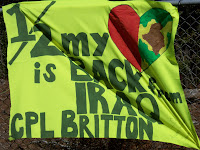
Afghanistan Bomb kills paratrooper
Fayetteville NC Observer December 23, 2009
A Fort Bragg soldier on his second deployment to Afghanistan was killed Friday when his vehicle struck a homemade bomb, the Pentagon said Tuesday.
Sgt. Albert D. Ware, 27, of Chicago, died in the Arghandab River Valley in Kandahar province in southern Afghanistan.
He is the 10th soldier from the 82nd Airborne Division’s 4th Brigade Combat Team killed since the brigade went to Afghanistan in the summer.
Canadian Soldier Killed In Afghanistan . . . .
Washington Post - 2 hours ago
AP KABUL -- The NATO-led military mission in Afghanistan says a Canadian soldier has been killed in the southern part of the country. ...
Afghanistan: Latest British Casualty Named . . . .
Telegraph.co.uk - 2 hours ago
UK Special forces comrades have paid tribute to Lance Corporal Tommy Brown, the Paratrooper who became Britain's fourth fatality in four days in Afghanistan. ...
NC-Based Marine killed in Afghanistan . . . .
San Jose Mercury News - 1 hour ago
AP CAMP LEJEUNE, NC—The Department of Defense has identified a North Carolina-based Marine from California killed in Afghanistan.
US admits failure in curbing drugs in Afghanistan....
Thu, 24 Dec 2009 Press TV
The US administration has admitted that Washington has failed to curb narcotics production and trafficking in Afghanistan.
The US State Department on Wednesday criticized Washington's 2-billion-dollar plan to combat the drug trade in Afghanistan for poor oversight and lack of strategy.
Afghan police mistakenly kill parliament member . . .
Lo Angeles Times, Dec. 24
The lawmaker and his son are killed in an ambush that had been set to find a wounded insurgent commander in Baghlan province, in Afghanistan's north.
National police hunting for a wounded insurgent commander mistakenly ambushed a vehicle carrying a member of the Afghan parliament, killing him and his son, provincial officials said Wednesday.
President Hamid Karzai ordered an investigation of the incident, which took place overnight in Baghlan province in Afghanistan's north.
Taliban fighters and other insurgents have made significant inroads in the province over the last year. A new NATO supply route runs through the area, making it a magnet for militant strikes.
The lawmaker, Mohammad Yunos Shirnagha, was returning home after a late-night meeting with constituents when the shootout with police erupted, said Gen. Kabir Andarabi, the provincial police chief.
The War At Home . . . .
Baltimore police locate where Fort Bragg soldier was shot
Fayetteville NC Observer
Baltimore police have located the crime scene where a Fort Bragg soldier was fatally shot Sunday night while home on leave from Afghanistan.
Detectives initially were unable to determine exactly where Pfc. Clifford J. Williams, 22, was shot in a sport utility vehicle because of the weekend's huge snowstorm, police spokesman Anthony Guglielmi said Wednesday.
"It's premature to speculate on any type of motive," Guglielmi said.
Police said Williams was shot on the way home from grocery shopping.
Williams' wife was at the crime scene but not in the vehicle as earlier reported, he said.
News reports said investigators believe a single gunman approached the vehicle and shot Williams through the driver's-side window. . . .
Williams went to Afghanistan in April and was scheduled to return to Fort Bragg in April 2010. The deployment was his first.
U.S. steps up special operations mission in Afghanistan
By Julian E. Barnes
December 16, 2009
Reporting from Washington - The U.S. military command has quietly shifted and intensified the mission of clandestine special operations forces in Afghanistan, senior officials said, targeting key figures within the Taliban, rather than almost exclusively hunting Al Qaeda leaders.
As a result of orders from Army Gen. Stanley A. McChrystal, the top U.S. and allied commander in Afghanistan, the special operations teams are focusing more on killing militants, capturing them or, whenever possible, persuading them to turn against the Taliban-led insurgency.
The number of raids carried out by such units as the Army's Delta Force and Navy's SEAL Team Six in Afghanistan has more than quadrupled in recent months. The teams carried out 90 raids in November, U.S. officials said, compared with 20 in May. U.S. special operations forces primarily conduct missions in eastern and southern Afghanistan.























